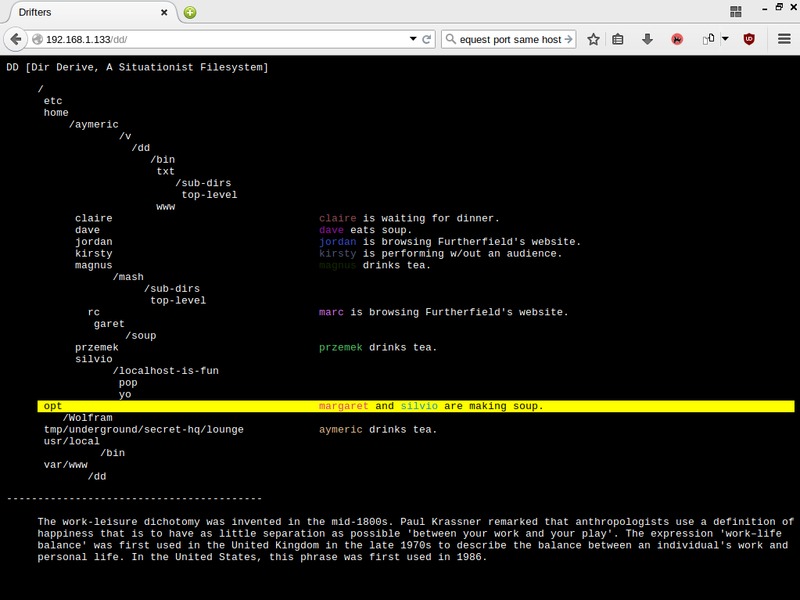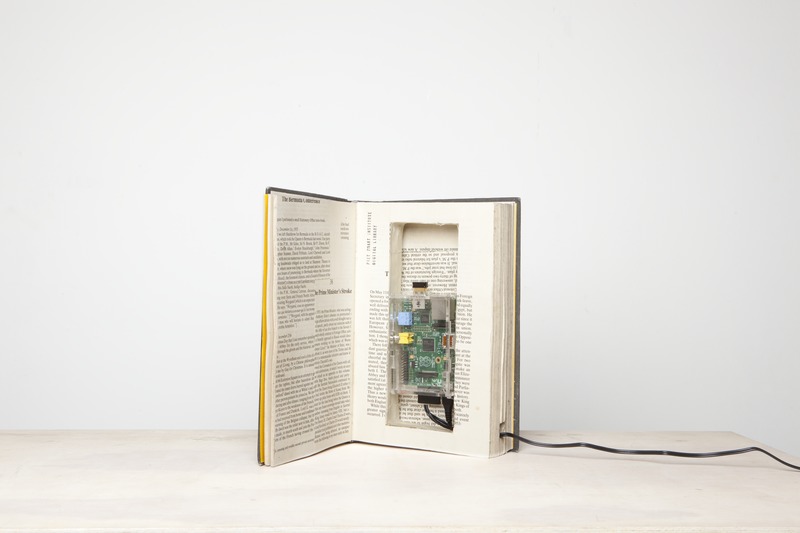
The Experimental Publishing study path is structured at two levels:
Histories of Experimental Publishing
Histories of Experimental Publishing is a series of lectures by core and guest tutors of the course. From Jiahu symbols to darknets, the act of making things public has always involved aesthetic, technological and social experimentation. In this lecture series, publishing will be broadly understood to encompass various symbolic forms and media, including text, image, sound and code. The focus will be on practices that are not always included in mainstream media histories, such as samizdat publishing, music distribution and warez culture. Each lecture will cover one particular medium and publishing (sub)culture. Visits of local experimental publishing initiatives (PrintRoom, Publication Studio, Zine Camp) will be part of the program.
Publishing as Practice
Publishing as Practice aims to develop critical tools (both theory and practice), to explore collaborative practices, editorial concepts and formats of display, graphic design and typographic experiment and new distribution models, through the study of publishing as a medium. What is a book? Under the drastic technological and socio-economical changes brought by the publishing industry, every parameter that used to define a book has been transformed, form authorship to expanded copyright practices, manufacturing, hardware and software, ownership and sharing knowledge, digitisation, preservation and all distribution models. In this context, what could be the role of publishing for artists and designers? Working together as an editorial board, as well as developing individual projects, this course consist of monthly sessions based on a matrix of research questions, publishing experiments and a public programme, where the traditional roles and function of publishing are questioned. These sessions will take the form of intense one or two-day workshops.
Publishing as Practice: Mapping the field. The shifting roles of editor, artist, author, designer, publisher, distributors, readers and collectors. Emerging models.
Publishing Experiments: Editorial concepts, manufacturing, printing techniques, information vs. visuality, (non)narrative structures, different hierarchy of information and the economy of the book will be investigated. Working with the school facilities.
Making things Public: Explore (self)publishing strategies, readership and the new economical models of production and distribution. Visit to professionals from the field. Defining new modes of dissemination and possible sustainable or distributed models for the editions produced during the programme.
Reading, Writing, and Research Methodologies Seminar
The Reading, Writing, and Research Methodologies Seminar is tailored towards (further) developing research methods within the first year of the master. By establishing a solid foundation of research skills, it will eventually prepare students for their Graduate research in the second year. Through reading core theoretical texts, and through the experimentation with different modes of writing, they will establish a common vocabulary and set of references to work from. The course aims to develop a writing practice appropriate to each students practice-based research, through applying general research methods to specific research projects. The course takes as axiomatic that the perceived division between practice and theory is essentially an illusion.
The seminar will include:
Throughout, there will be an emphasis on working collectively, whether in a larger discussion group or in smaller reading and writing groups.
Techno-legal Templates and Sandbox Culture
Discussing past, present, and future strategies of publishing and access to knowledge would not be complete without talking about the relationship existing between the distribution of information and the technological and legal frameworks that permit it. In the past decades, such relationship has been articulated in different ways, yet always revolving around the questions of intellectual property laws that need to be either reinforced, reformed, abolished, or simply ignored. From guerilla open access to the normalisation of free culture licensing, from remix culture to GitHub repository forks, we will explore in a series of lecture and readings how code, both legal and software, is effectively shaping publishing culture, by the means of different constitutive templates and platforms. In the process, we will discuss notions of commons, public space and movement, and whether or not these can exist as globalised universal concepts, as opposed to singular sandboxed ideas linked to specific communities, platforms and practices.
The Importance of Being Archive
Archives used to belong to the realm of large institutions and national governments. In an attempt to collect documents and records, such as letters, official papers, photographs, recorded material, or computer files archives tried to preserve a historical consciousness. In a time when the creation of documents and their aggregation into all sorts of different – especially online – archives has become part of everyday life the role and function of archives and its content is changing. Through modes of iteration, appropriations, copies, leaks and other permutations archives can short-circuit, defy and disrupt emphasising the limits of historical representation. By critically analysing theory, reflecting on archival practices and making documentation, this course explores the messy entanglements of the ways documents are created and collected, systems (dis)function and how networks of people, bots and algorithms trigger transformations.
Tools for Procedural Publishing
Tools for Procedural Publishing consists of monthly 2-day workshop, where we will approach the tools, protocols and workflows essential for publishing across digital environments. Through a process of experimentation, research and discussion we will engage and explore the social, political and technological context and conflicts of these technologies.
In each session we'll focus on the production of an outcome, which will require practical and hands-on application of the subject and tools explored.
Outcomes will range from the creation of a website, a social file system, a acoustic data transmitting network, a collaborative and distributed work environment, a multi-format publication, floppy disk videos, audio auscultations of file systems, a digital library, and self hosting servers.
We wont develop these processes for making things public from scratch, but by taking full advantage of the plethora of free software applications, which lend themselves to the UNIX philosophy of using simple and discrete programs, articulated into a complex pipeline. Such formula allows for fast prototyping of complex and idiosyncratic processes, whose outcomes ensue from the choice of programs, inputs and settings given.
Planning:
HTML: the mother of all markups
Social Shell
Encoding/Decoding
Versioning
Hybrid Publishing
Digital Audio and Video
Networking
Special Issues are a means of putting the ideas explored in the different strands of the course into practice in the form of a series of publications on a roughly 6 week cycle. Each "issue" addresses a specific theme, often coordinated with outside events and collaborations, and culminates in a "release". The form of each issue varies as a means of critically engaging with the diverse media, scales, and historical specificity of a particular issue. This multiplicity of form rejects the conception of "cross-platform" and "multi-media" as seamless, uniform, and ever improving.
Special Issues considers software not just as a means of getting things done, but as a significant writing space for critically engaging with culture. To this end, the tools and methods used to produce each publication are themselves part of the release itself. Code is not monolithic and linear but rather speaks across different systems, at different temporalities, in different voices and modes.
Zine Camp, a festival to make friends and zines, is an open workspace connecting like-minded zinesters and newbies from Rotterdam to national/international zinesters and newbies. The aim is to make zine together, but also to provide a space and place to socialize and collaborate in an attempt to discover and foster a growing community of zine-makers in the NL and abroad.
This is why projects like Aaaaarg, Ubu, Monoskop and the others are so crucial at the moment, because they point to a different future, different not only from today's monopolies but also from tomorrows. — Felix Stalder
Even if reading is increasingly turning digital, Public Libraries have not been able to follow the same path. While technically it is possible to allow anyone acces to books from anywhere, the legal reality is quite different. Libraries are not able to give access to digital resources in the same way as they can with physical books. This is why initiatives such as Monoskop, aaarg.org, sci-hub and libgen are essential as they collect and distribute electronic texts, an indispensible work in times of austerity and privatisation of education. They are serving readers across the globe a collection of materials that start to look quite different than the libraries we were used to, content that is acting out the true potential of digital publishing, distributed freely and accessibly without the limits imposed by the academic commercial complex. University researchers as well as those studying outside institutions have all come to rely on these 'shadow libraries', but can't speak out for them publicly. However critical these resources have become, the recent courtcase of Elsevier vs. Sci-hub and Libgen and another one underway against aaaarg.org shows how vulnerable the projects actually are. While each of them takes a different political stance, in the end of the day their various forms of civil disobedience only count as illegal action.
How can the right to access to knowledge be held up against claims of copyright? Interfacing the law is an attempt to build a platform, both in the sense of an on-line interface and as a public discourse, that would allow us to openly discuss, reflect and respond to the next wave of courtcases waiting to happen. It is urgent that we find ways to make the public debate transcend the juridical binary of illegal vs. legal, and claim political legitimacy for sharing digital books.
In collaboration with librarians, lawyers, activists and archivists, we invite participants to develop their own interfaces to the law: collective annotation systems, digital document analyses, (il)legal use cases, library tools, mirrored servers ... These prototypes will be brought together in a public event taking place June 2017. In order to develop the projects technically and conceptually, we will collectively analyse legal documents relevant to the case, learn from historical activism and civil disobedience against the law and explore the contents of massive text-collections available in pirate, shadow and amateur digital libraries.
Interfacing the law is developed by Constant in collaboration with Memory of the World and MayDay rooms. The project is part of Society for Library Access (SLAX), a coalition of people and organisations that wants to publicly address the antagonism between the access to knowledge and the current copyright regime.

Unconfimed and in development special issues.
A Situationist Filesystem What does a ‘situationist’ filesystem look like? 
Bibliotecha
Bibliotecha is a local offline network for distribution of digital texts, that allows local communities to build and share their electronic text collections. Bibliotecha relies on a small computer (RaspberryPi) running open-source software to serve ebooks over a local and open WIFI hotspot. Using the browser to connect to it, one is given the option to retrieve or donate ebooks to that Bibliotecha node.
